AI Survey Research Forms in the Hospitality Industry: Improving Guest Experiences
AI Survey Research Forms in the Hospitality Industry: Improving Guest Experiences
AI Survey Research Forms in the Hospitality Industry: Improving Guest Experiences



In the ever-evolving landscape of the hospitality industry, where the goal is to turn every guest’s stay into a memorable experience, understanding guest feedback has never been more crucial. Yet, the journey from guest experience to actionable insights can feel as labyrinthine as navigating a five-star hotel's hidden corridors. Enter AI-driven survey forms—the hospitality sector’s latest technological ally. These modern marvels are revolutionizing how hotels, resorts, and restaurants collect and utilize guest feedback, transforming the traditional survey into an intelligent, dynamic tool that boosts performance and guest satisfaction. Buckle up as we explore the impact of AI surveys in the hospitality world!
Traditional Survey Methods vs. AI-Driven Surveys
Traditional Survey Methods
For years, the hospitality industry relied on traditional survey methods to gather guest feedback.
Paper-Based Forms: These were handed out at the front desk or placed in rooms. They often ended up crumpled in the trash or filled out hastily at checkout.
Email Surveys: Sent post-stay, these relied on guests’ willingness to respond after their vacation glow had faded.
On-Site Interviews: Personal interactions provided in-depth insights but were time-consuming and often intrusive.
These methods, while foundational, had limitations:
- Low Response Rates: Guests often skipped surveys, resulting in skewed data.
- Delayed Feedback: Processing took time, delaying any potential improvements.
- Limited Adaptability: Static questions that couldn’t delve deeper based on initial responses.
AI-Driven Surveys
AI-driven surveys, on the other hand, are the high-tech equivalent of having a concierge who can anticipate your needs before you even realize them:
Real-Time Processing: AI analyzes responses instantly, providing actionable insights immediately.
Dynamic Questioning: The survey adapts based on previous answers, making it more engaging and insightful.
Enhanced Engagement: AI determines the best times to prompt guests, increasing response rates.
With AI, surveys aren’t just data-gathering tools; they’re interactive experiences that learn and evolve with each response, ensuring that every piece of feedback is valuable and timely.
Key Performance Metrics for the Hospitality Sector:
1. Guest Satisfaction: Overall contentment with the stay, including amenities, service, and overall experience.
2. Net Promoter Score (NPS): A measure of guest loyalty based on their likelihood to recommend the establishment.
3. Average Daily Rate (ADR): The average revenue earned per occupied room.
4. Occupancy Rate: The percentage of available rooms occupied over a period.
5. Revenue Per Available Room (RevPAR): A metric that combines ADR and occupancy rate.
6. Guest Retention: The ability to retain repeat guests and maintain loyalty.
7. Service Quality: Ratings on various service aspects, from check-in efficiency to room cleanliness.
These metrics help gauge the overall performance and guest satisfaction, ultimately influencing the establishment’s reputation and profitability.
Challenges in Gathering Guest Experiences
Despite the critical importance of guest feedback, gathering it isn’t always straightforward. Here’s why.
1. Low Participation
Traditional surveys often suffer from low participation rates. Guests may not be motivated to fill out lengthy forms or emails after their stay.
2. Unstructured Feedback
Free-form feedback is hard to analyze and quantify. Traditional surveys often missed out on capturing the nuance of guest sentiments.
3. Timing Issues
Reaching guests at the right moment is challenging. Catch them too early, and they may not have a full picture of their stay; too late, and the experience may have faded from memory.
4. Response Bias
Guests who have extreme experiences (very positive or very negative) are more likely to respond, skewing the data.
5. Delayed Action
Traditional surveys can take weeks to analyze, delaying any corrective measures.
Impact on Performance: Hospitality Industry
Failing to effectively gather and act on guest feedback can significantly impact a hospitality establishment.
Decreased Satisfaction: Without understanding and addressing issues, guest satisfaction can plummet.
Poor Reviews: Dissatisfied guests are more likely to leave negative reviews, harming the establishment’s reputation.
Lost Revenue: Low satisfaction and poor reviews lead to lower occupancy rates and reduced revenue.
How AI-Driven Surveys and Insights Help the Hospitality Sector
AI surveys bring a new level of sophistication to guest feedback, offering several advantages over traditional methods.
1. Real-Time Insights
AI-driven surveys can process responses immediately, allowing management to address issues in real-time. This instant feedback loop can turn a negative experience into a positive one before the guest even checks out.
2. Sentiment Analysis
AI can perform sentiment analysis on open-ended responses, capturing the subtleties of guest feedback and providing a more nuanced understanding of guest sentiments.
3. Personalized Questioning
Surveys adapt based on initial responses, asking follow-up questions that probe deeper into specific areas of concern, resulting in richer, more actionable data.
4. Increased Engagement
By using AI to determine the best times and methods to prompt guests, participation rates can be significantly improved.
5. Proactive Improvements
AI can identify trends and patterns in feedback, allowing establishments to address common issues proactively rather than reactively.
Use Case
A theme-based resort adopted an AI-driven survey platform to enhance their guest feedback process.
- Implemented dynamic surveys that were adapted based on initial guest feedback.
- Used real-time sentiment analysis to gauge guest happiness.
- Acted on feedback immediately, resolving issues during the stay.
- Increased survey participation by 50% through targeted prompting.
- Improved overall guest satisfaction scores by 35%.
Types of Surveys Conducted by the Hospitality Sector
Hospitals conduct various surveys to gather insights across different touchpoints.
1. Post-Stay Surveys
These gather feedback on the overall stay experience, including room comfort, service quality, and amenities.
2. In-Stay Surveys
Sent during the stay, these surveys can capture real-time feedback on specific experiences, such as dining or housekeeping.
3. Event Surveys
For guests attending events or conferences, these surveys gather feedback on event management, facilities, and overall satisfaction.
4. Loyalty Program Surveys
These target loyalty program members, gathering insights into their experiences and preferences to enhance the loyalty offerings.
5. Service Recovery Surveys
Sent after a complaint has been resolved, these surveys assess guest satisfaction with the resolution process.
How Gathering Guest Insights is a Game Changer
Effectively gathering and acting on guest insights can transform the guest experience.
1. Enhanced Guest Satisfaction
By understanding and addressing guest needs and preferences, hospitality establishments can create more personalized and enjoyable experiences.
2. Improved Service Quality
Feedback allows management to identify and rectify service issues, ensuring consistently high-quality service.
3. Increased Loyalty
Guests who feel heard and valued are more likely to return, boosting retention rates and fostering loyalty.
4. Better Reputation
Positive feedback and satisfied guests contribute to better online reviews and a stronger reputation, attracting more guests.
5. Informed Decision-Making
AI insights provide data-driven recommendations, allowing for more strategic decisions that enhance overall performance.
Conclusion: Improving Guest Experiences with AI Survey Forms
In the fast-paced world of hospitality, where guest satisfaction is paramount, AI-driven surveys using tools like Metaforms.ai are revolutionizing how establishments gather and act on feedback. By providing real-time insights, dynamic questioning, and deeper analysis, these modern tools transform guest feedback from a static form into a powerful engine for continuous improvement.
Whether it’s a cozy boutique hotel or a sprawling luxury resort, embracing AI surveys can elevate the guest experience, driving satisfaction, loyalty, and ultimately, success in the hospitality industry. So, next time you check into a hotel and receive a friendly, insightful survey—thank the AI behind it for making your stay that much better! Sign-up with Metaforms today.
In the ever-evolving landscape of the hospitality industry, where the goal is to turn every guest’s stay into a memorable experience, understanding guest feedback has never been more crucial. Yet, the journey from guest experience to actionable insights can feel as labyrinthine as navigating a five-star hotel's hidden corridors. Enter AI-driven survey forms—the hospitality sector’s latest technological ally. These modern marvels are revolutionizing how hotels, resorts, and restaurants collect and utilize guest feedback, transforming the traditional survey into an intelligent, dynamic tool that boosts performance and guest satisfaction. Buckle up as we explore the impact of AI surveys in the hospitality world!
Traditional Survey Methods vs. AI-Driven Surveys
Traditional Survey Methods
For years, the hospitality industry relied on traditional survey methods to gather guest feedback.
Paper-Based Forms: These were handed out at the front desk or placed in rooms. They often ended up crumpled in the trash or filled out hastily at checkout.
Email Surveys: Sent post-stay, these relied on guests’ willingness to respond after their vacation glow had faded.
On-Site Interviews: Personal interactions provided in-depth insights but were time-consuming and often intrusive.
These methods, while foundational, had limitations:
- Low Response Rates: Guests often skipped surveys, resulting in skewed data.
- Delayed Feedback: Processing took time, delaying any potential improvements.
- Limited Adaptability: Static questions that couldn’t delve deeper based on initial responses.
AI-Driven Surveys
AI-driven surveys, on the other hand, are the high-tech equivalent of having a concierge who can anticipate your needs before you even realize them:
Real-Time Processing: AI analyzes responses instantly, providing actionable insights immediately.
Dynamic Questioning: The survey adapts based on previous answers, making it more engaging and insightful.
Enhanced Engagement: AI determines the best times to prompt guests, increasing response rates.
With AI, surveys aren’t just data-gathering tools; they’re interactive experiences that learn and evolve with each response, ensuring that every piece of feedback is valuable and timely.
Key Performance Metrics for the Hospitality Sector:
1. Guest Satisfaction: Overall contentment with the stay, including amenities, service, and overall experience.
2. Net Promoter Score (NPS): A measure of guest loyalty based on their likelihood to recommend the establishment.
3. Average Daily Rate (ADR): The average revenue earned per occupied room.
4. Occupancy Rate: The percentage of available rooms occupied over a period.
5. Revenue Per Available Room (RevPAR): A metric that combines ADR and occupancy rate.
6. Guest Retention: The ability to retain repeat guests and maintain loyalty.
7. Service Quality: Ratings on various service aspects, from check-in efficiency to room cleanliness.
These metrics help gauge the overall performance and guest satisfaction, ultimately influencing the establishment’s reputation and profitability.
Challenges in Gathering Guest Experiences
Despite the critical importance of guest feedback, gathering it isn’t always straightforward. Here’s why.
1. Low Participation
Traditional surveys often suffer from low participation rates. Guests may not be motivated to fill out lengthy forms or emails after their stay.
2. Unstructured Feedback
Free-form feedback is hard to analyze and quantify. Traditional surveys often missed out on capturing the nuance of guest sentiments.
3. Timing Issues
Reaching guests at the right moment is challenging. Catch them too early, and they may not have a full picture of their stay; too late, and the experience may have faded from memory.
4. Response Bias
Guests who have extreme experiences (very positive or very negative) are more likely to respond, skewing the data.
5. Delayed Action
Traditional surveys can take weeks to analyze, delaying any corrective measures.
Impact on Performance: Hospitality Industry
Failing to effectively gather and act on guest feedback can significantly impact a hospitality establishment.
Decreased Satisfaction: Without understanding and addressing issues, guest satisfaction can plummet.
Poor Reviews: Dissatisfied guests are more likely to leave negative reviews, harming the establishment’s reputation.
Lost Revenue: Low satisfaction and poor reviews lead to lower occupancy rates and reduced revenue.
How AI-Driven Surveys and Insights Help the Hospitality Sector
AI surveys bring a new level of sophistication to guest feedback, offering several advantages over traditional methods.
1. Real-Time Insights
AI-driven surveys can process responses immediately, allowing management to address issues in real-time. This instant feedback loop can turn a negative experience into a positive one before the guest even checks out.
2. Sentiment Analysis
AI can perform sentiment analysis on open-ended responses, capturing the subtleties of guest feedback and providing a more nuanced understanding of guest sentiments.
3. Personalized Questioning
Surveys adapt based on initial responses, asking follow-up questions that probe deeper into specific areas of concern, resulting in richer, more actionable data.
4. Increased Engagement
By using AI to determine the best times and methods to prompt guests, participation rates can be significantly improved.
5. Proactive Improvements
AI can identify trends and patterns in feedback, allowing establishments to address common issues proactively rather than reactively.
Use Case
A theme-based resort adopted an AI-driven survey platform to enhance their guest feedback process.
- Implemented dynamic surveys that were adapted based on initial guest feedback.
- Used real-time sentiment analysis to gauge guest happiness.
- Acted on feedback immediately, resolving issues during the stay.
- Increased survey participation by 50% through targeted prompting.
- Improved overall guest satisfaction scores by 35%.
Types of Surveys Conducted by the Hospitality Sector
Hospitals conduct various surveys to gather insights across different touchpoints.
1. Post-Stay Surveys
These gather feedback on the overall stay experience, including room comfort, service quality, and amenities.
2. In-Stay Surveys
Sent during the stay, these surveys can capture real-time feedback on specific experiences, such as dining or housekeeping.
3. Event Surveys
For guests attending events or conferences, these surveys gather feedback on event management, facilities, and overall satisfaction.
4. Loyalty Program Surveys
These target loyalty program members, gathering insights into their experiences and preferences to enhance the loyalty offerings.
5. Service Recovery Surveys
Sent after a complaint has been resolved, these surveys assess guest satisfaction with the resolution process.
How Gathering Guest Insights is a Game Changer
Effectively gathering and acting on guest insights can transform the guest experience.
1. Enhanced Guest Satisfaction
By understanding and addressing guest needs and preferences, hospitality establishments can create more personalized and enjoyable experiences.
2. Improved Service Quality
Feedback allows management to identify and rectify service issues, ensuring consistently high-quality service.
3. Increased Loyalty
Guests who feel heard and valued are more likely to return, boosting retention rates and fostering loyalty.
4. Better Reputation
Positive feedback and satisfied guests contribute to better online reviews and a stronger reputation, attracting more guests.
5. Informed Decision-Making
AI insights provide data-driven recommendations, allowing for more strategic decisions that enhance overall performance.
Conclusion: Improving Guest Experiences with AI Survey Forms
In the fast-paced world of hospitality, where guest satisfaction is paramount, AI-driven surveys using tools like Metaforms.ai are revolutionizing how establishments gather and act on feedback. By providing real-time insights, dynamic questioning, and deeper analysis, these modern tools transform guest feedback from a static form into a powerful engine for continuous improvement.
Whether it’s a cozy boutique hotel or a sprawling luxury resort, embracing AI surveys can elevate the guest experience, driving satisfaction, loyalty, and ultimately, success in the hospitality industry. So, next time you check into a hotel and receive a friendly, insightful survey—thank the AI behind it for making your stay that much better! Sign-up with Metaforms today.
In the ever-evolving landscape of the hospitality industry, where the goal is to turn every guest’s stay into a memorable experience, understanding guest feedback has never been more crucial. Yet, the journey from guest experience to actionable insights can feel as labyrinthine as navigating a five-star hotel's hidden corridors. Enter AI-driven survey forms—the hospitality sector’s latest technological ally. These modern marvels are revolutionizing how hotels, resorts, and restaurants collect and utilize guest feedback, transforming the traditional survey into an intelligent, dynamic tool that boosts performance and guest satisfaction. Buckle up as we explore the impact of AI surveys in the hospitality world!
Traditional Survey Methods vs. AI-Driven Surveys
Traditional Survey Methods
For years, the hospitality industry relied on traditional survey methods to gather guest feedback.
Paper-Based Forms: These were handed out at the front desk or placed in rooms. They often ended up crumpled in the trash or filled out hastily at checkout.
Email Surveys: Sent post-stay, these relied on guests’ willingness to respond after their vacation glow had faded.
On-Site Interviews: Personal interactions provided in-depth insights but were time-consuming and often intrusive.
These methods, while foundational, had limitations:
- Low Response Rates: Guests often skipped surveys, resulting in skewed data.
- Delayed Feedback: Processing took time, delaying any potential improvements.
- Limited Adaptability: Static questions that couldn’t delve deeper based on initial responses.
AI-Driven Surveys
AI-driven surveys, on the other hand, are the high-tech equivalent of having a concierge who can anticipate your needs before you even realize them:
Real-Time Processing: AI analyzes responses instantly, providing actionable insights immediately.
Dynamic Questioning: The survey adapts based on previous answers, making it more engaging and insightful.
Enhanced Engagement: AI determines the best times to prompt guests, increasing response rates.
With AI, surveys aren’t just data-gathering tools; they’re interactive experiences that learn and evolve with each response, ensuring that every piece of feedback is valuable and timely.
Key Performance Metrics for the Hospitality Sector:
1. Guest Satisfaction: Overall contentment with the stay, including amenities, service, and overall experience.
2. Net Promoter Score (NPS): A measure of guest loyalty based on their likelihood to recommend the establishment.
3. Average Daily Rate (ADR): The average revenue earned per occupied room.
4. Occupancy Rate: The percentage of available rooms occupied over a period.
5. Revenue Per Available Room (RevPAR): A metric that combines ADR and occupancy rate.
6. Guest Retention: The ability to retain repeat guests and maintain loyalty.
7. Service Quality: Ratings on various service aspects, from check-in efficiency to room cleanliness.
These metrics help gauge the overall performance and guest satisfaction, ultimately influencing the establishment’s reputation and profitability.
Challenges in Gathering Guest Experiences
Despite the critical importance of guest feedback, gathering it isn’t always straightforward. Here’s why.
1. Low Participation
Traditional surveys often suffer from low participation rates. Guests may not be motivated to fill out lengthy forms or emails after their stay.
2. Unstructured Feedback
Free-form feedback is hard to analyze and quantify. Traditional surveys often missed out on capturing the nuance of guest sentiments.
3. Timing Issues
Reaching guests at the right moment is challenging. Catch them too early, and they may not have a full picture of their stay; too late, and the experience may have faded from memory.
4. Response Bias
Guests who have extreme experiences (very positive or very negative) are more likely to respond, skewing the data.
5. Delayed Action
Traditional surveys can take weeks to analyze, delaying any corrective measures.
Impact on Performance: Hospitality Industry
Failing to effectively gather and act on guest feedback can significantly impact a hospitality establishment.
Decreased Satisfaction: Without understanding and addressing issues, guest satisfaction can plummet.
Poor Reviews: Dissatisfied guests are more likely to leave negative reviews, harming the establishment’s reputation.
Lost Revenue: Low satisfaction and poor reviews lead to lower occupancy rates and reduced revenue.
How AI-Driven Surveys and Insights Help the Hospitality Sector
AI surveys bring a new level of sophistication to guest feedback, offering several advantages over traditional methods.
1. Real-Time Insights
AI-driven surveys can process responses immediately, allowing management to address issues in real-time. This instant feedback loop can turn a negative experience into a positive one before the guest even checks out.
2. Sentiment Analysis
AI can perform sentiment analysis on open-ended responses, capturing the subtleties of guest feedback and providing a more nuanced understanding of guest sentiments.
3. Personalized Questioning
Surveys adapt based on initial responses, asking follow-up questions that probe deeper into specific areas of concern, resulting in richer, more actionable data.
4. Increased Engagement
By using AI to determine the best times and methods to prompt guests, participation rates can be significantly improved.
5. Proactive Improvements
AI can identify trends and patterns in feedback, allowing establishments to address common issues proactively rather than reactively.
Use Case
A theme-based resort adopted an AI-driven survey platform to enhance their guest feedback process.
- Implemented dynamic surveys that were adapted based on initial guest feedback.
- Used real-time sentiment analysis to gauge guest happiness.
- Acted on feedback immediately, resolving issues during the stay.
- Increased survey participation by 50% through targeted prompting.
- Improved overall guest satisfaction scores by 35%.
Types of Surveys Conducted by the Hospitality Sector
Hospitals conduct various surveys to gather insights across different touchpoints.
1. Post-Stay Surveys
These gather feedback on the overall stay experience, including room comfort, service quality, and amenities.
2. In-Stay Surveys
Sent during the stay, these surveys can capture real-time feedback on specific experiences, such as dining or housekeeping.
3. Event Surveys
For guests attending events or conferences, these surveys gather feedback on event management, facilities, and overall satisfaction.
4. Loyalty Program Surveys
These target loyalty program members, gathering insights into their experiences and preferences to enhance the loyalty offerings.
5. Service Recovery Surveys
Sent after a complaint has been resolved, these surveys assess guest satisfaction with the resolution process.
How Gathering Guest Insights is a Game Changer
Effectively gathering and acting on guest insights can transform the guest experience.
1. Enhanced Guest Satisfaction
By understanding and addressing guest needs and preferences, hospitality establishments can create more personalized and enjoyable experiences.
2. Improved Service Quality
Feedback allows management to identify and rectify service issues, ensuring consistently high-quality service.
3. Increased Loyalty
Guests who feel heard and valued are more likely to return, boosting retention rates and fostering loyalty.
4. Better Reputation
Positive feedback and satisfied guests contribute to better online reviews and a stronger reputation, attracting more guests.
5. Informed Decision-Making
AI insights provide data-driven recommendations, allowing for more strategic decisions that enhance overall performance.
Conclusion: Improving Guest Experiences with AI Survey Forms
In the fast-paced world of hospitality, where guest satisfaction is paramount, AI-driven surveys using tools like Metaforms.ai are revolutionizing how establishments gather and act on feedback. By providing real-time insights, dynamic questioning, and deeper analysis, these modern tools transform guest feedback from a static form into a powerful engine for continuous improvement.
Whether it’s a cozy boutique hotel or a sprawling luxury resort, embracing AI surveys can elevate the guest experience, driving satisfaction, loyalty, and ultimately, success in the hospitality industry. So, next time you check into a hotel and receive a friendly, insightful survey—thank the AI behind it for making your stay that much better! Sign-up with Metaforms today.
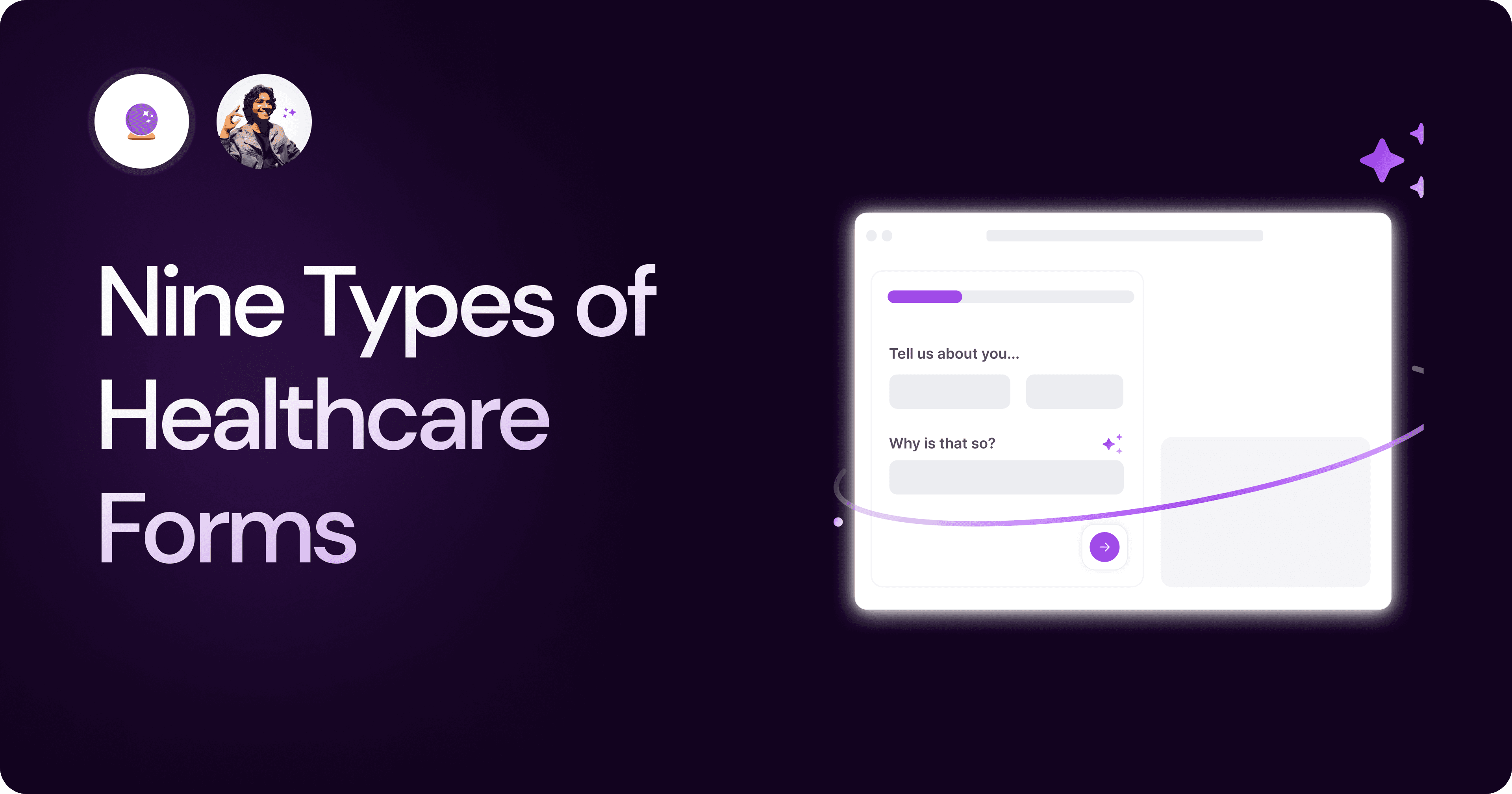
Nine Types of Healthcare and Medical Forms.
Medical forms are a must-have for any healthcare business or practitioner. Learn about the different kinds of medical and healthcare forms.
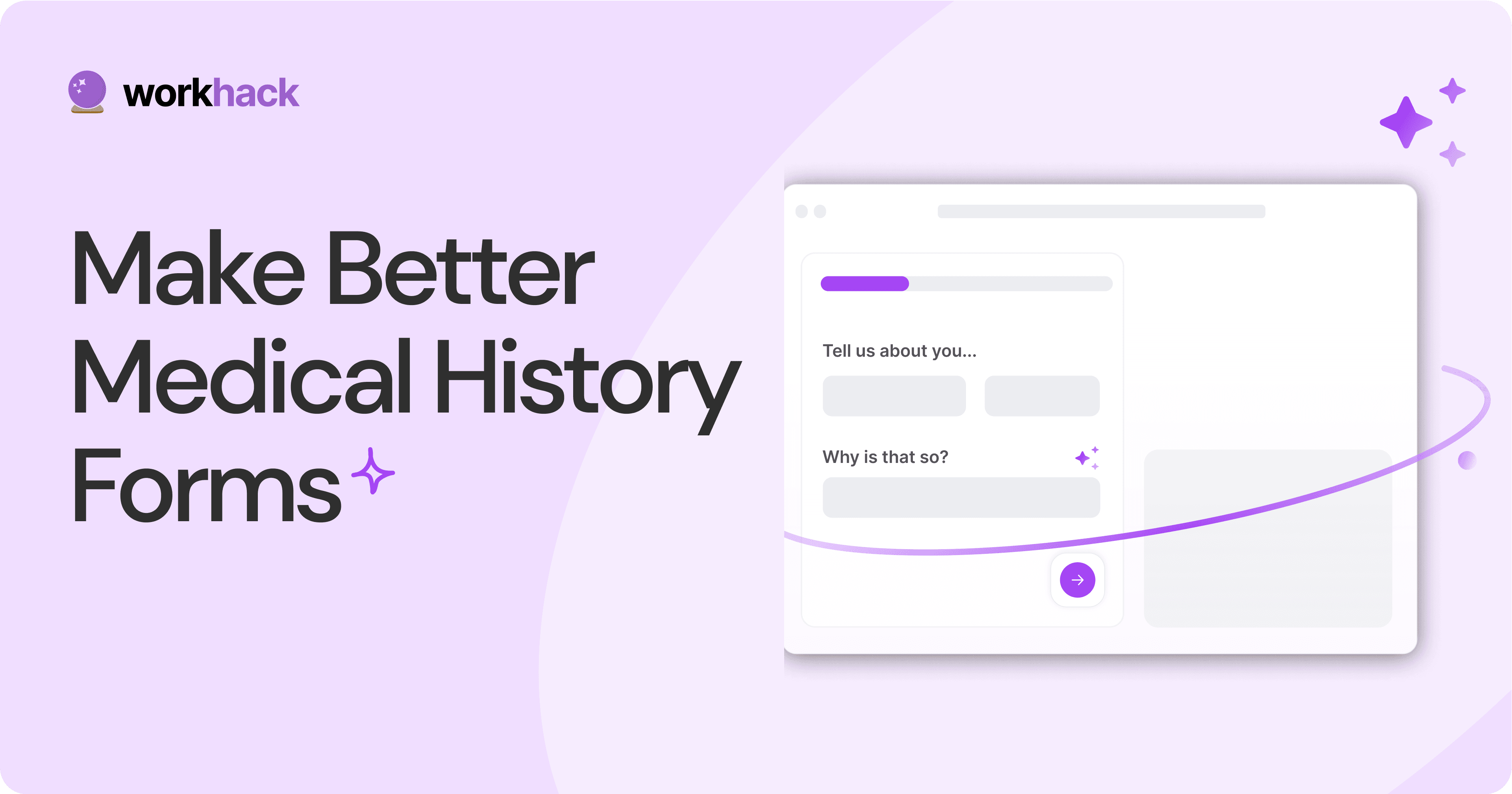
4 Tips for Better Medical History Forms.
Medical history forms are central to patient care, onboarding, and medical administration records. Learn how to make them easier to fill.
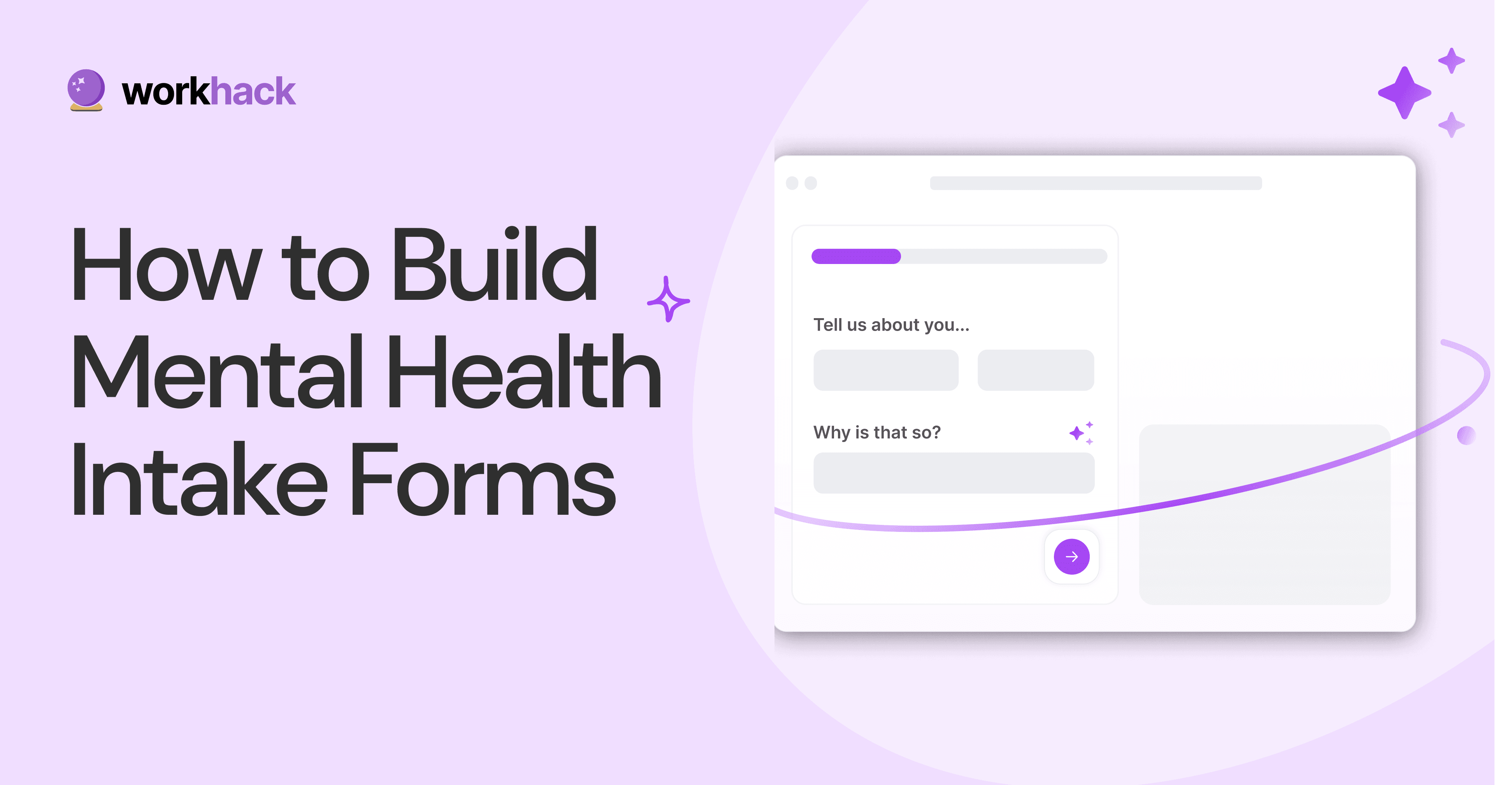
How to Build Mental Health Intake Forms?
Mental health intake forms are not like patient intake forms. Mental health intake forms deal with far more sensitive data and have specific design methods.
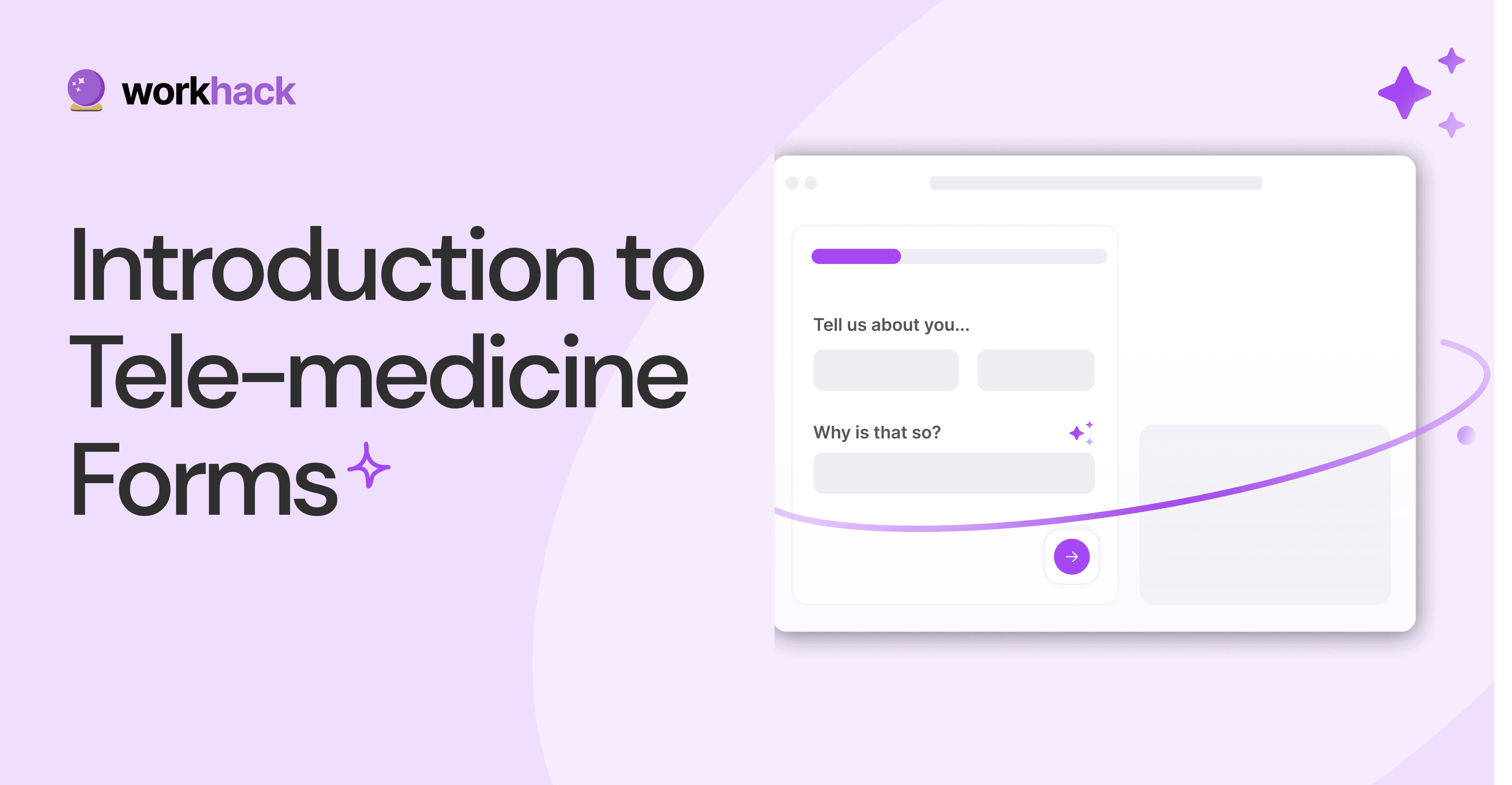
What, Why and How of Telemedicine Forms.
Telemedicine is on the rise and with different form builders out there, which one best suits your needs as a healthcare services provider?
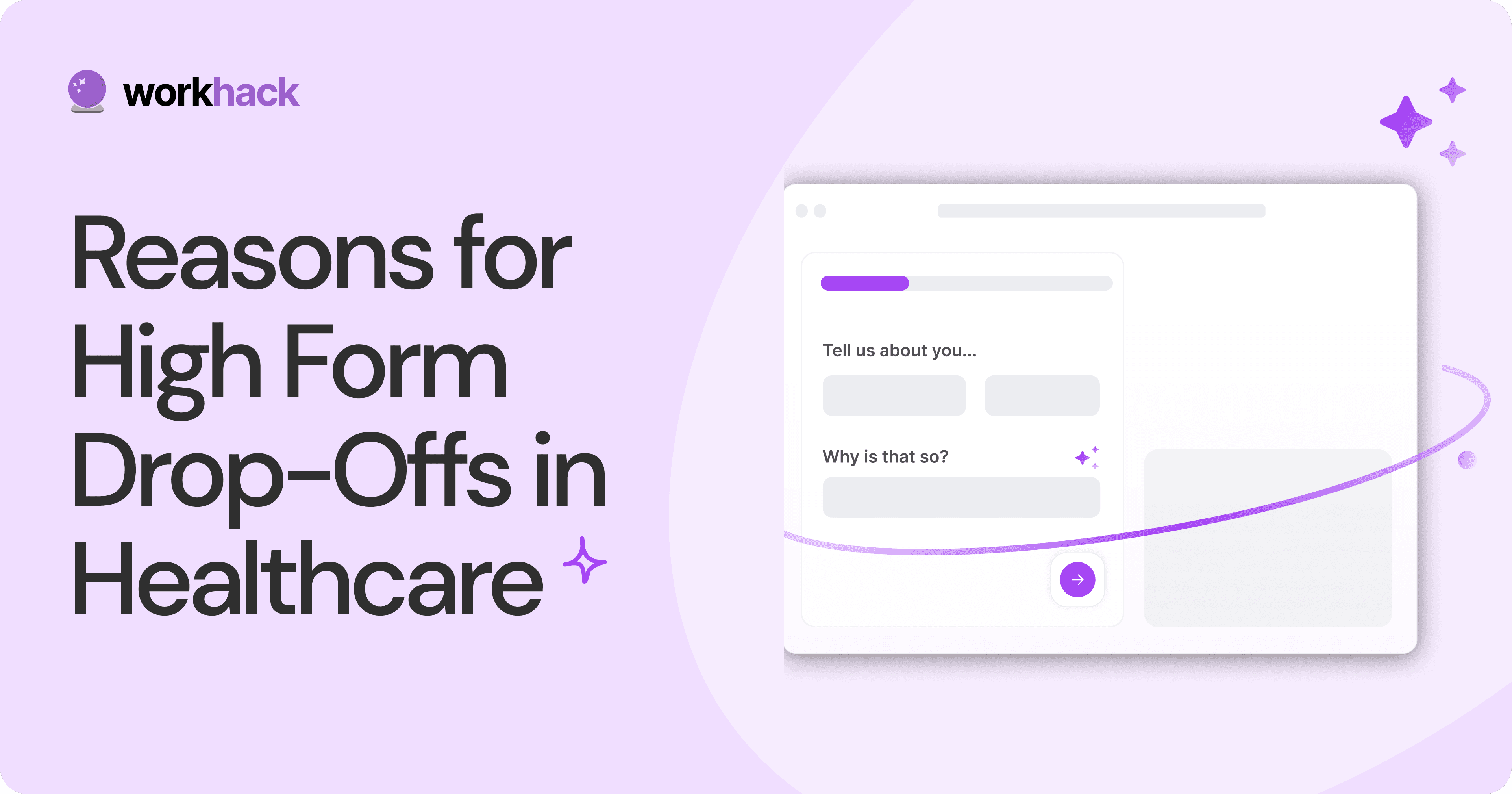
3 Reasons for Major Drop-Offs in Medical Forms.
No matter which healthcare form we pick, there are major drop-off reasons. We shall dive into the top 3 and learn how to resolve them in your next form.
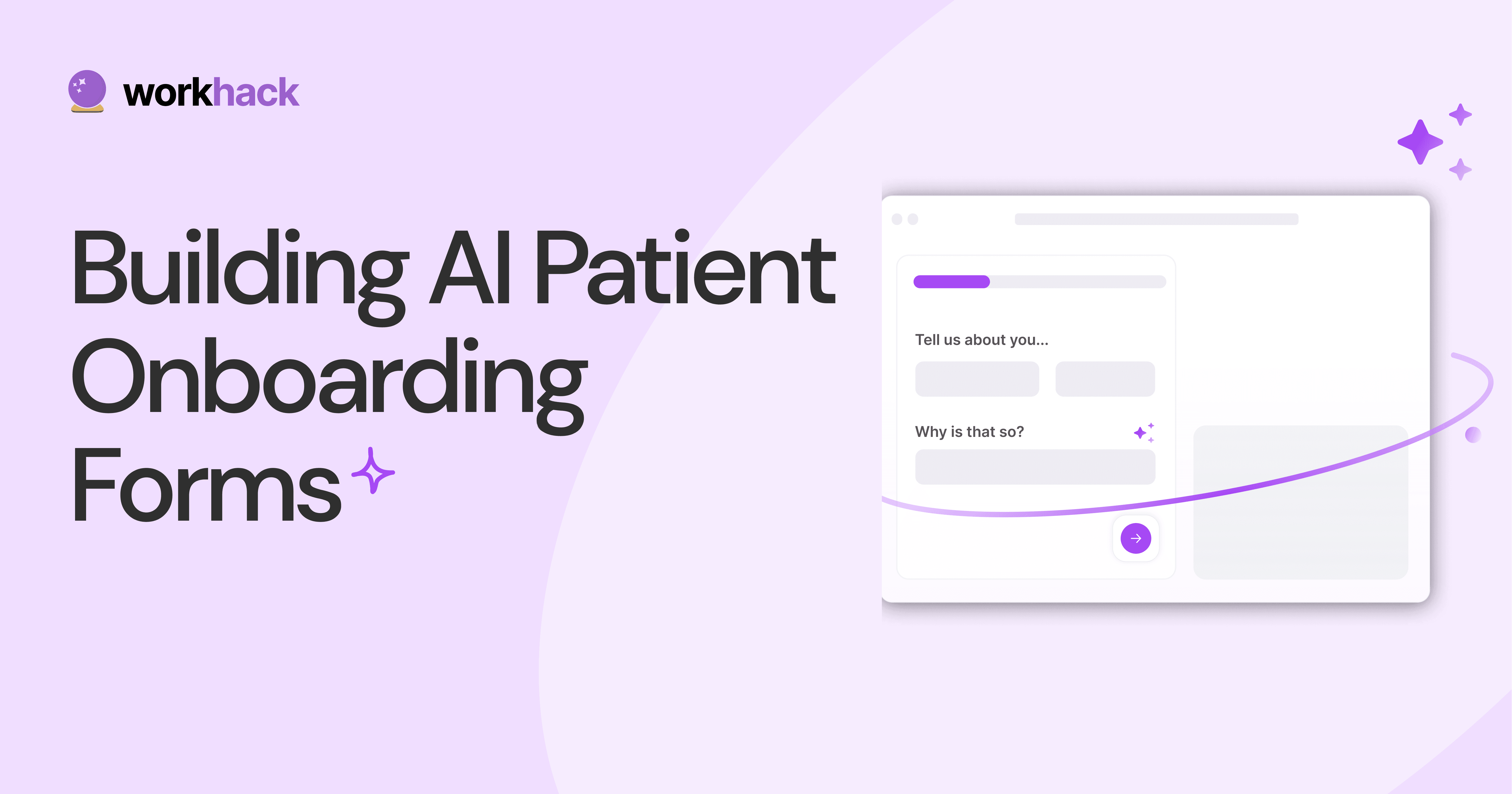
Patient Onboarding Forms - From Click to Clinic.
Patient onboarding forms are the first touchpoint for patients; getting this right for higher conversion rates is a must-have. Learn how to perfect them now.
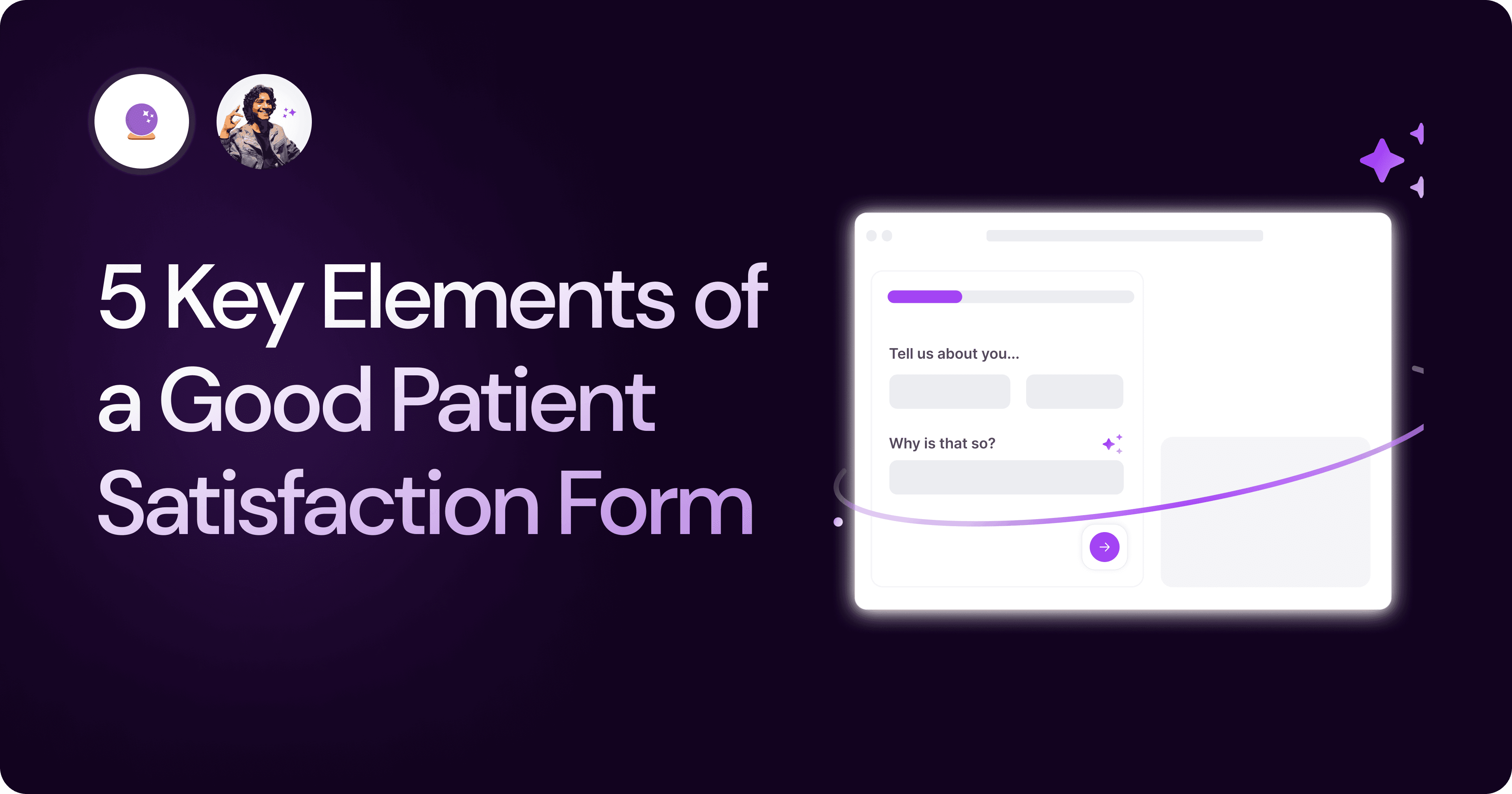
5 Key Parts of a Good Patient Satisfaction Form.
The goal of patient satisfaction surveys is to course-correct the services of a healthcare provider. Patient feedback leads to a culture of patient-centric care.
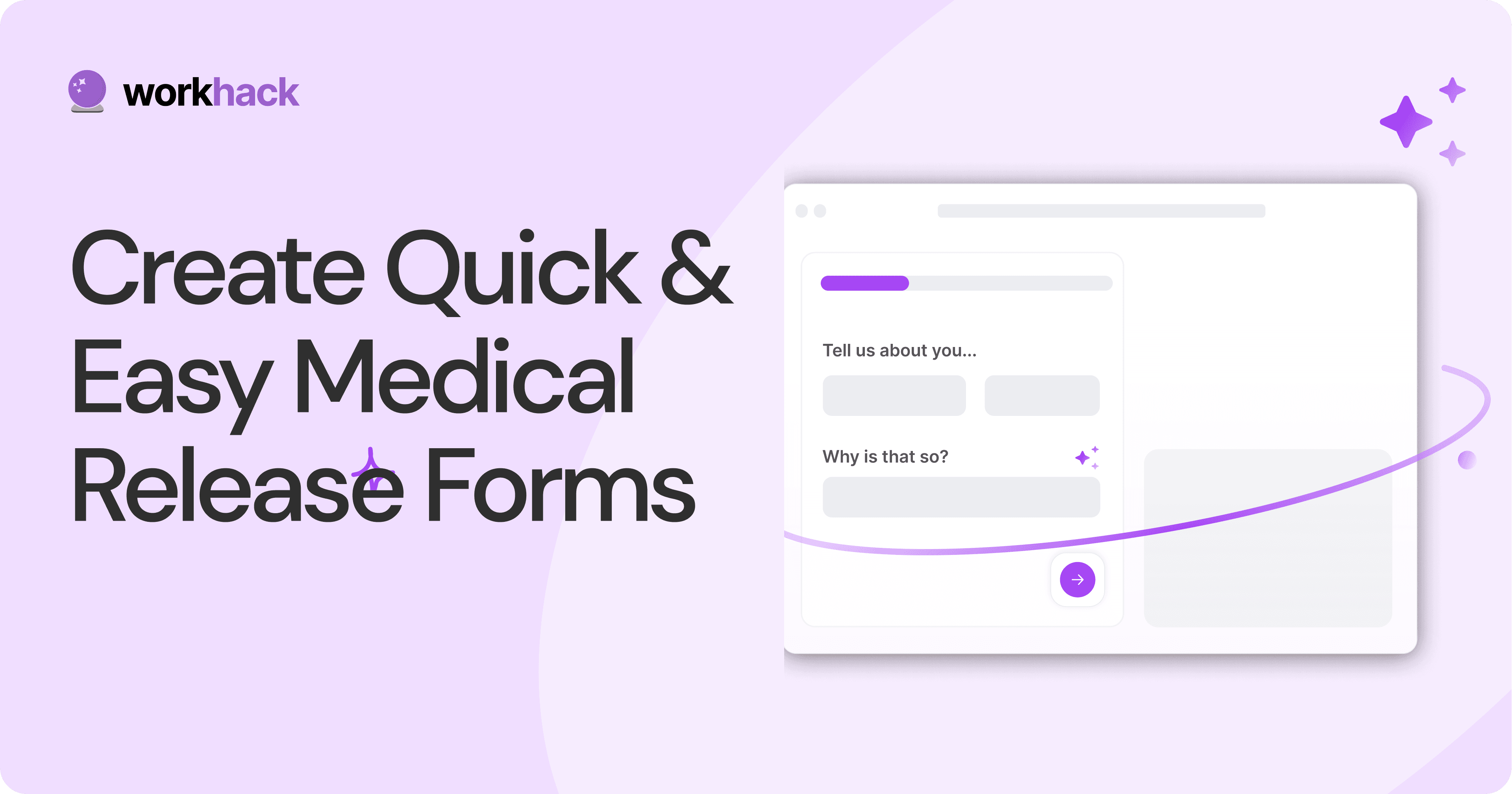
Build Quick and Easy Medical Release Forms.
Every HIPAA-compliant healthcare provider comes across medical release forms that involve details from medical history forms. Can they be shipped fast? Yes.

Nine Types of Healthcare and Medical Forms.
Medical forms are a must-have for any healthcare business or practitioner. Learn about the different kinds of medical and healthcare forms.

4 Tips for Better Medical History Forms.
Medical history forms are central to patient care, onboarding, and medical administration records. Learn how to make them easier to fill.

How to Build Mental Health Intake Forms?
Mental health intake forms are not like patient intake forms. Mental health intake forms deal with far more sensitive data and have specific design methods.

What, Why and How of Telemedicine Forms.
Telemedicine is on the rise and with different form builders out there, which one best suits your needs as a healthcare services provider?

3 Reasons for Major Drop-Offs in Medical Forms.
No matter which healthcare form we pick, there are major drop-off reasons. We shall dive into the top 3 and learn how to resolve them in your next form.

Patient Onboarding Forms - From Click to Clinic.
Patient onboarding forms are the first touchpoint for patients; getting this right for higher conversion rates is a must-have. Learn how to perfect them now.

5 Key Parts of a Good Patient Satisfaction Form.
The goal of patient satisfaction surveys is to course-correct the services of a healthcare provider. Patient feedback leads to a culture of patient-centric care.

Build Quick and Easy Medical Release Forms.
Every HIPAA-compliant healthcare provider comes across medical release forms that involve details from medical history forms. Can they be shipped fast? Yes.

Nine Types of Healthcare and Medical Forms.
Medical forms are a must-have for any healthcare business or practitioner. Learn about the different kinds of medical and healthcare forms.

4 Tips for Better Medical History Forms.
Medical history forms are central to patient care, onboarding, and medical administration records. Learn how to make them easier to fill.

How to Build Mental Health Intake Forms?
Mental health intake forms are not like patient intake forms. Mental health intake forms deal with far more sensitive data and have specific design methods.

What, Why and How of Telemedicine Forms.
Telemedicine is on the rise and with different form builders out there, which one best suits your needs as a healthcare services provider?

3 Reasons for Major Drop-Offs in Medical Forms.
No matter which healthcare form we pick, there are major drop-off reasons. We shall dive into the top 3 and learn how to resolve them in your next form.

Patient Onboarding Forms - From Click to Clinic.
Patient onboarding forms are the first touchpoint for patients; getting this right for higher conversion rates is a must-have. Learn how to perfect them now.

5 Key Parts of a Good Patient Satisfaction Form.
The goal of patient satisfaction surveys is to course-correct the services of a healthcare provider. Patient feedback leads to a culture of patient-centric care.

Build Quick and Easy Medical Release Forms.
Every HIPAA-compliant healthcare provider comes across medical release forms that involve details from medical history forms. Can they be shipped fast? Yes.

Nine Types of Healthcare and Medical Forms.
Medical forms are a must-have for any healthcare business or practitioner. Learn about the different kinds of medical and healthcare forms.

4 Tips for Better Medical History Forms.
Medical history forms are central to patient care, onboarding, and medical administration records. Learn how to make them easier to fill.

How to Build Mental Health Intake Forms?
Mental health intake forms are not like patient intake forms. Mental health intake forms deal with far more sensitive data and have specific design methods.

What, Why and How of Telemedicine Forms.
Telemedicine is on the rise and with different form builders out there, which one best suits your needs as a healthcare services provider?

3 Reasons for Major Drop-Offs in Medical Forms.
No matter which healthcare form we pick, there are major drop-off reasons. We shall dive into the top 3 and learn how to resolve them in your next form.

Patient Onboarding Forms - From Click to Clinic.
Patient onboarding forms are the first touchpoint for patients; getting this right for higher conversion rates is a must-have. Learn how to perfect them now.

5 Key Parts of a Good Patient Satisfaction Form.
The goal of patient satisfaction surveys is to course-correct the services of a healthcare provider. Patient feedback leads to a culture of patient-centric care.

Build Quick and Easy Medical Release Forms.
Every HIPAA-compliant healthcare provider comes across medical release forms that involve details from medical history forms. Can they be shipped fast? Yes.
Subscribe to stay updated.
Subscribe to stay updated.
Subscribe to stay updated.
HC

HC

HC

HC

70+ people from across industries read our emails.
HC

HC

70+ people from across industries read our emails.
HC

HC

HC

70+ people from across industries read our emails.




Bangalore, India / San Francisco, US
WorkHack Inc. 2023
Bangalore, India
San Francisco, US
WorkHack Inc. 2023
WorkHack Inc. 2023
Bangalore, India / San Francisco, US
WorkHack Inc. 2023
Bangalore, India / San Francisco, US



